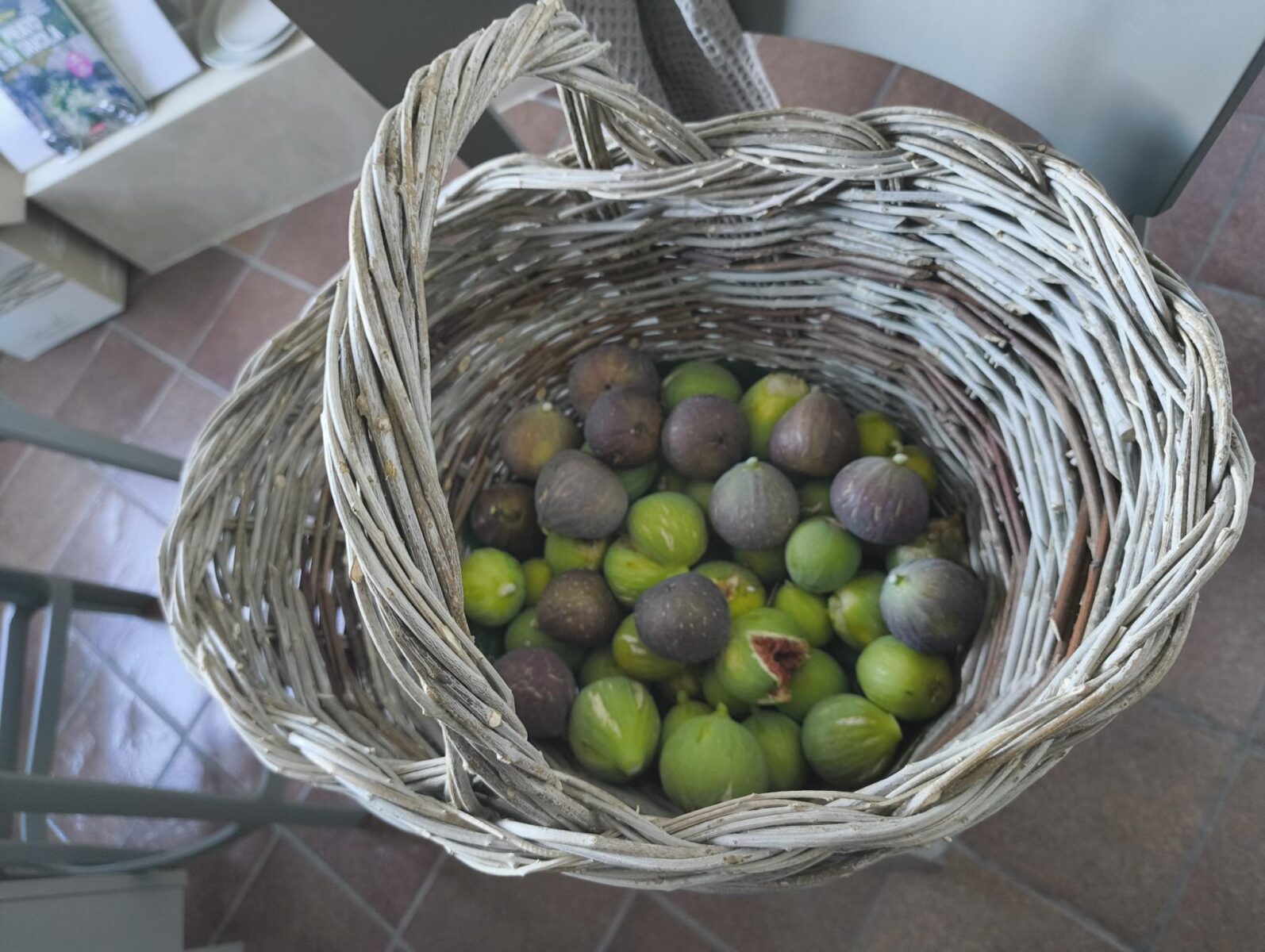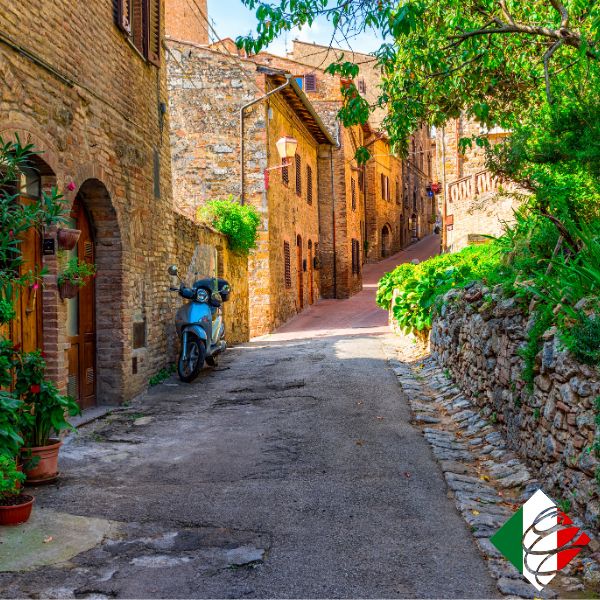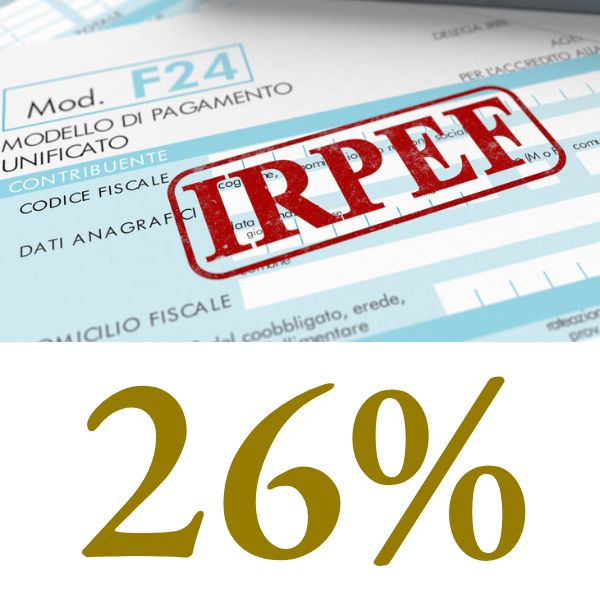Hello again and welcome back to my Ezine after the summer break. I hope you are well and that the somewhat fresher Italian summer was a surprise for you as well. We were not sweltering in 38 degrees this year but enjoying a more pleasurable low 30s for most of the summer. It was a welcome change from last year, for example, when I saw the last rain in mid-May and not again until mid/end Sept.
Financial update Italy – September 2025
By Gareth Horsfall
This article is published on: 8th September 2025
It was also my first holiday away after our change of lifestyle to the country and with all this land, trees, and plants to manage. I have to say that although time at the beach was great and a welcome break from the country, I did find myself wanting to come back and see how all the plants were doing and also how the olives were developing after lots of summer rainstorms. It was pure curiosity because on my return I found that the whole situation is largely as it was last year at the same time. Grass needs cutting, and a few other jobs need doing, but in general everything is coming along nicely.
For those of you with whom I am friends on FB, you will have seen that I came back to a bumper crop of apples, pears, and figs. The figs are finding their way into my pancia quite quickly and are super delicious. (and I have my new wicker basket for collection – which my wife jokingly bought me at a ‘sagra’ event recently, very Laura Ashley)

Amelia is famous for its figs, so it’s no surprise that the trees are full of fruit again, exactly the same as last year. The apples and pears, I have now discovered, are different varieties and were pretty much falling off the tree, so I harvested the rest and they have now gone into cold storage until I can get round to doing something with them. (My mum reminded me that my grandfather used to sell fruit and veg and, to preserve fruit, he used to wrap each single piece in newspaper and then put them in cold storage somewhere. Apparently they kept for a few months.
Mine have gone into the underground cellar, which hosts the resident bats. It maintains a constant temperature of about 12 degrees all year round. They can stay there until I get round to dealing with them shortly).
The break also gave me some nice time to reflect on landscaping, round No. 2, this winter. I have made some decisions on some trees which are currently unmanageable. I think I will be lopping off the tops and starting to prune them again into smaller and much more workable trees. Also, I had some ideas about other landscaping possibilities, but one step at a time. Of course, there are the olives to deal with in a couple of months and they seem to be coming along just fine, although the mosca has attacked many this year due to the cooler and wetter summer temperatures. Also, after a serious potatura in the spring, the fruits are fewer than last year. I just hope that the oil content is higher. It’s all a big learning curve!
So now my country life update is out of the way, onto the financial context of this Ezine, but before that I also wanted to share with you some rather disturbing news which I think you should all know about, whether a client or not……..and to watch out for.

Fraud and AI
Earlier in the year we introduced some new security protocols regarding withdrawals from policies/portfolios which clients hold with us. We had been made aware that another financial planning company operating in the Middle East had received a fraudulent request to withdraw funds from a client portfolio. But in this case it turns out that it wasn’t the client making the request, but in fact some Artificial Intelligence application. The worrying aspect of this was that the adviser was contacted directly by the client on WhatsApp and email asking to withdraw a sum of money and have it paid to their nominated bank account. The adviser had an exchange of messages with the so-called “client,” not suspecting anything untoward. When the money had been paid, the actual client rang to ask the adviser why money had been deducted from his portfolio.
I think you can probably understand the ins and outs of this situation. It was a fraudulent approach using Artificial Intelligence.
AI certainly has its positive uses (I have translated some of the content in this Ezine from Italian to English which used to take me a long time, but was done in 3 seconds). However, this is certainly one very dangerous and worrying angle.
Therefore, since the start of the summer The Spectrum IFA Group have introduced a policy of meeting with the client in person or, if not possible due to geographical restrictions, then an video call with documentation required, where a withdrawal is requested. A phone call is not acceptable, nor purely communication via message or email.
We have introduced this to protect our clients and will keep track of the situation as and when we hear more. However, whether you are a client or not, please be alert to messaging and emails when dealing with your financial affairs. Try and engage either in person or via video call ONLY. Do not assume that messages or emails are from the actual person. If in doubt, pick up the phone and call!

Capital gains tax on the sale of property in Italy
I am not sure why, but like buses, the same query seems to crop up multiple times at the same moment, and so it happens that I received a number of queries this summer around the capital gains tax on the sale of property, as a resident in Italy and specifically the implications of selling property either in Italy or abroad.
So let’s look at the details…
The baseline rule is that if you are a resident in Italy and you sell a property after the first full five fiscal years from purchase (not your Prima Casa – different rules apply here, read on for details), you are NOT required to pay tax on any capital gain (CGT) resulting from the sale. This applies to properties you hold in Italy or abroad and applies whether it is your 2nd or 15th property!
This stems from the idea of a speculative intent to buy/sell property and where there is no intent then capital gains tax is not applied. (a nice tax planning opportunity!)
Speculation in Italy is defined as follows:
- the property is sold for consideration (e.g. sale, exchange, contribution to a company)
- the property is sold within five years of purchase or construction
- the property must not have been used as the seller’s (or family’s) main residence if it is a residential unit.
These rules also apply to property located abroad!
If the sale is subject to taxation (because you are selling within the first 5 years since purchase), then you can either opt for:
A substitute tax of 26% (standard capital gains tax rate) at the time of the deed (the notary is responsible for the payment), or
The standard income tax rates (IRPEF), with the possibility of using deductible and creditable expenses such as bonus edilizie, pharmacy expenses, doctors’ bills, etc. Bear in mind that the lowest rate of income tax in Italy is also 23%, so depending on your other income for the year you could fall in the lowest rate of income tax (€0–28,000 p.a.) and be able to reduce the taxable amount even further with deductions.
Below is a list of the main rules to consider:
Taxable conditions
As with all things taxation, it is important to understand the conditions:
- Capital gains tax applies as a result of property purchased, or built, less than five years earlier.
- An exemption is given for urban residential units that, for most of the time between purchase (or construction) and sale, were used as the main residence of the seller or their family. (The idea of Prima Casa)
- As well as, in all cases, capital gains realised from the sale of land that can be used for building (terreno edificabile) according to planning rules in force at the time of the sale.
In the case of donated/inherited property, the five-year period is calculated from the donor’s acquisition date.
(This is particularly important for anyone who might inherit a property from a deceased parent, for example. If you wish to dispose of the property it would be more advantageous to do so in the probate process, otherwise you may have to wait another 5 years before you could dispose of the property to avoid capital gains tax…. if any). However, if you take the property into your name and then can sell it quickly, you may avoid capital gains tax if the property value has not increased between the acquisition and sale.
Exemptions
Exempt from taxation are:
- Sales of properties used as the seller’s or their family’s main residence for most of the period between purchase/construction and resale (the 5-year rule does not apply here – Prima Casa rule!).
- Sales of inherited properties (per Article 67, paragraph 1, letter b) TUIR).

The five-year rule
The 5 years run from the purchase deed (or from the later date of transfer of ownership rights).
- If built by the seller, then the 5 years run from completion of construction.
- The period ends on the date of the sale deed, regardless of when payment is made.
- Renovations or extensions do not restart the five-year period!
Speculative operations: property flipping
If you fancy yourself as a property magnate and decide to try your hand at buying, renovating, and then selling repeatedly within the 5 years (“property flipping”), this constitutes a commercial activity and in this case:
- The capital gains are taxable, and
- The seller is required to operate as a business with VAT registration and related tax and social security obligations.
Calculation of taxable capital gain
It’s a simple formula:
Sale price – (Purchase price / Construction cost + related documented costs)
Allowable related costs include:
- Notarial and accessory expenses,
- Indirect taxes paid at purchase (registration, mortgage, cadastral taxes, or VAT),
- Improvement expenses (extraordinary maintenance, renovations),
- Costs for removing tenants.
It is important to keep all documentation relating to any property purchase/sale for at least 10 years in Italy.
For construction:
- Building contracts, design fees, municipal charges, post-construction improvements.
The gain is taxable in the year the payment is received.

Taxation methods: IRPEF (income tax) or substitute tax (flat rate of 26%)
Capital gains from property sales fall under “other income” (reddito diverso) and you have 2 options for taxation:
- Ordinary IRPEF (income tax) – the gain is added to your total taxable income and taxed progressively (23% up to €28,000, 35% from €28,000–50,000, 43% above €50,000). Deductible and creditable expenses can reduce your tax.
This is a nice potential financial planning option because you may choose to split the tax between spouses by sharing ownership, or put it in one person’s name rather than another to maximise your lowest income tax brackets. It has multiple possibilities and should be explored should the need arise.
- Substitute tax of 26% – flat tax, applied at the time of the notarial deed. The notary withholds and pays it. No deductions/credits can be offset. This is also not subject to tax audit, so may be a preferable option for some.
Generally, taxpayers with other taxable income find the 26% substitute tax more advantageous.
Other cases
- Donation: 5 -year period runs from donor’s acquisition date.
- Built by seller: 5-year period runs from completion.
- Main residence: exempt if used as main home for most of the ownership period, even within 5 years.
- Building land: always taxable when sold; substitute tax cannot be applied.
- Agricultural land: taxable only if sold within 5 years.
- Property with buildings to be demolished: treated as building land → taxable.
- Previously subdivided property: taxation depends on whether subdivision counts as new construction.
Statute of limitations for tax assessments
The Agenzia delle Entrate can assess omitted/under-reported gains:
– Within 5 years from the year after the tax return was filed;
So there we have it. All the facts regarding capital gains tax and property in Italy. For most people I know it rarely comes into consideration because the properties are owned for more than 5 years. However, on odd occasion CGT needs to be considered. For somewhere like the UK that introduced CGT on property purchases for non UK residents, the tax interest lies in the UK and not in Italy which is a relief because you don’t have to worry about paying it in 2 places. However, if you think it is applicable to you, then take the necessary advice before you sell.


